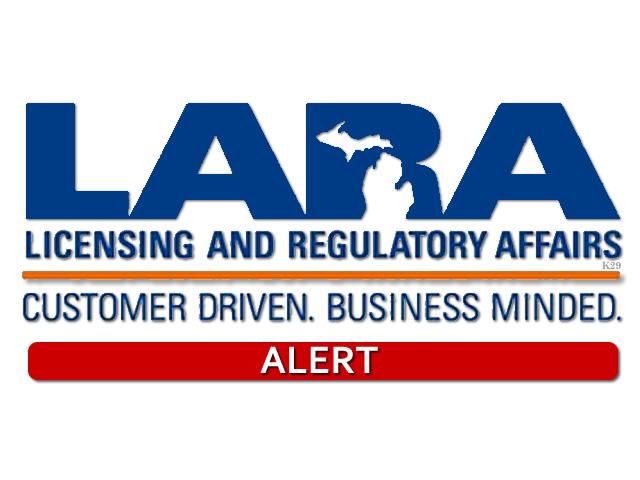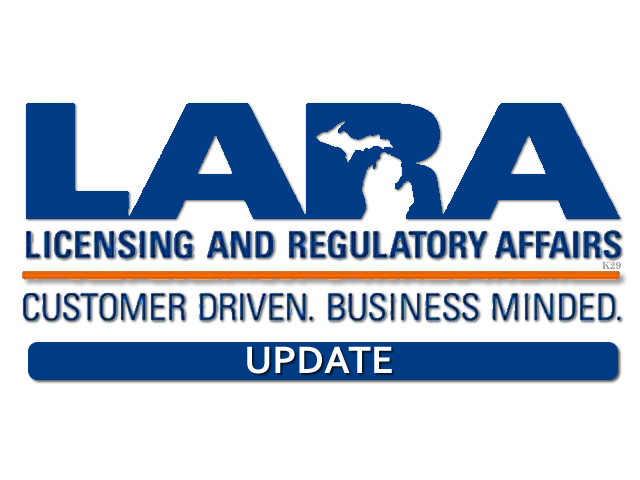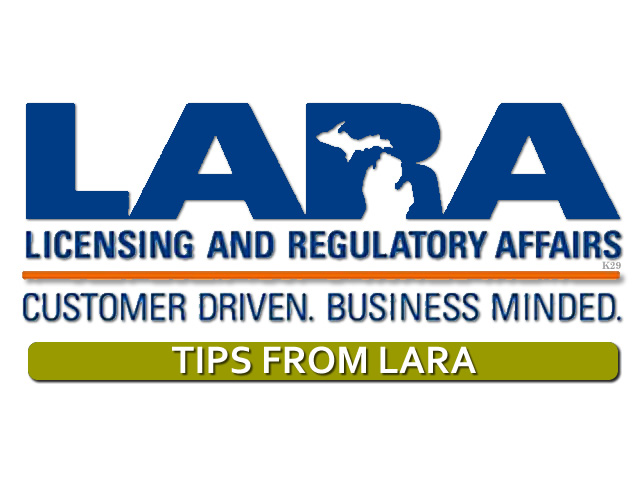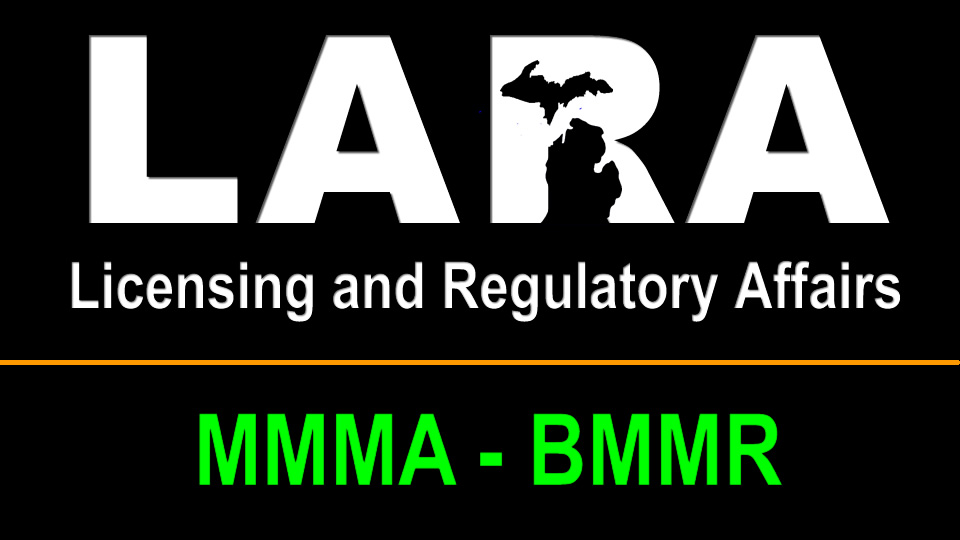
Jul 19, 2018 | Blog, LARA-MMFLA Info, Michigan Medical Marhuana Regulation
LARA-MMFLA – ADVISORY BULLETIN
July 17, 2018
This advisory bulletin does not constitute legal advice and is subject to change. Licensees are encouraged to seek legal counsel to ensure their operations comply with the Medical Marihuana Facilities Licensing Act and associated
Emergency Rules.
30-Day Transition Period (Emergency Rule #20)
Emergency Rule 20 allows for a transition period of 30 calendar days during which marihuana product can be entered into the statewide monitoring system to ensure statewide tracking. These 30 days begin on the day a state operating license is issued to a licensee for the first time (the only exception is for additional licenses issued to the same license holder for a stacked license after a first license has already been issued).
Within those 30 days, a licensee shall:
- Comply with ALL testing requirements as prescribed by the act and rules, including moisture content, potency analysis, foreign matter inspection, microbial and mycotoxin screening, chemical residue, metals screening, residual solvents levels and water activity.
- Record all marihuana product in the statewide monitoring system and tag or package all inventory that has been identified in the statewide monitoring system.
The above requirements pertain to all marihuana and marihuana-infused products remaining in inventory at the time of licensure.
After the 30-calendar-day period, any marihuana product that has not been identified in the statewide system under these rules and the Medical Marihuana Facilities Licensing Act (MMFLA) is prohibited from being onsite at a marihuana facility.
A violation of this rule may result in sanctions and/or fines. At any time during this 30-calendar-day period, and thereafter, a marihuana facility is subject to inspection.
Additional information relating to the statewide monitoring system can be found in the This advisory bulletin does not constitute legal advice and is subject to change. Licensees are encouraged to seek legal counsel to ensure their operations comply with the Medical Marihuana Facilities Licensing Act and associated
Emergency Rules.
MMFLA Sections 501 and 502 provide that growers and processors must use a secure transporter to transport marihuana unless the facilities are within the same location and public roadways are not used.
Additionally, the MMFLA specifies that – prior to Dec. 31, 2018 – growers and processors have 30 days once their license is issued to transfer marihuana plants, seeds, and seedlings if they are lawfully possessed by an individual formerly registered as a primary caregiver who is an active employee of the grower or processor.
This 30-day period coincides with the 30-calendar-days given for licensees to enter items into the statewide monitoring system.
Read the full Release
Komorn Law has represented numerous clients through the legal chaos of starting up a business in the Michigan Medical Marihuana Industry.
Contact Us For More Information.
800-656-3557

Jul 19, 2018 | Blog, LARA-MMFLA Info, Michigan Medical Marhuana Regulation
Updated Forms for Medical Marihuana Registry Identification Card Now Available
July 9, 2018 – Updated MMMP Form.
Michigan residents may apply for a Michigan Medical Marihuana Program Registry Identification Card if they have been diagnosed with any of the 11 new qualifying conditions approved today by LARA Director Shelly Edgerton.
Updated application packets for Michigan residents 18 years and older and for those under the age of 18 are now available on the Bureau of Medical Marihuana Regulation (BMMR) website. The following conditions have been added to the physician certification form in the updated application packet:
- Arthritis
- Autism
- Chronic Pain
- Colitis
- Inflammatory Bowel Disease
- Obsessive Compulsive Disorder
- Parkinson’s
- Rheumatoid Arthritis
- Spinal Cord Injury
- Tourette’s Syndrome
- Ulcerative Colitis
Applicants are reminded of the following when applying for a registry identification card:
- Patients should only send one complete application and then wait for a response from BMMR. If duplicate applications or miscellaneous documents are submitted, the application may be denied, or its processing delayed.
- Patients should not allow other individuals or third parties to submit their applications or any other documents to the MMMP as patients will be unable to determine when or if their applications were submitted.
- Patients should not allow other individuals or third parties to retain copies of their documents, state-issued driver licenses, personal identification cards, or voter registrations as that increases the possibility of fraudulent submissions.
- The Michigan Medical Marihuana Program (MMMP) is not affiliated with any third-party business operations, “dispensaries,” provisioning centers, caregivers, or certifying physicians and is not associated with any business operation that uses the terms “Michigan Medical Marihuana Program” or “MMMP” in their name or advertising.
- Applicants often receive inaccurate information from third parties that result in their applications being delayed or denied.
- Third-party business operations which tell patients that their application and physician certification serve as a temporary registration card are putting the patients at risk of possible arrest. According to state law, patients or caregivers must present their valid registry identification card and a valid driver license – or government-issued identification card with photo – to law enforcement to be protected from arrest.
- BMMR recommends that applicants wait until they receive a registry card before engaging in the medical use of marihuana.
While there are currently no licensed provisioning centers in the state of Michigan, patients who wish to acquire medical marihuana or medical marihuana-infused products from licensed provisioning centers in the future will need to present a valid registry identification card at the time of purchase.
Komorn Law has represented numerous clients through the legal chaos of starting up a business in the Michigan Medical Marihuana Industry.
Contact Us For More Information.
800-656-3557

Jul 14, 2018 | Blog, Michigan Medical Marhuana Regulation
Prohibited Appearances and Packaging of Medical Marihuana Products
The Medical Marihuana Facilities Licensing Act Emergency Rules establish protocols regarding edible marihuana products. Per Rule 33, the term ‘edible marihuana product’ means any marihuana-infused product containing marihuana that is intended for human consumption in a manner other than smoke inhalation. It is important to note the following:
• No edible marihuana product can be in a shape, color, package, or labeled in a manner that it would appeal to minors aged 17 years or younger. No edible marihuana product can be associated with or have cartoons, caricatures, toys, colors, designs, shapes, labels, or package that would appeal to minors.
• No edible marihuana product can be easily confused with commercially sold candy. The use of the word candy or candies on the packaging or labeling is prohibited.
• An edible marihuana product must be in child resistant packages or containers
• A processor is prohibited from producing an edible marihuana product that requires time or temperature control for safety. The end-product must be a stable shelf-life edible marihuana product.
Read the entire tip with pictured examples here

Jul 13, 2018 | Blog, Michigan Medical Marhuana Regulation
How does the application process work and who can apply for a license?
Anyone — individual or business — who feels that they can satisfy statutory and administrative rule requirements for a marihuana facility license may apply for a license. BMMR will begin accepting applications on December 15, 2017. There is no deadline to complete the application process.
On December 15, 2017, LARA will begin accepting online or paper form applications, utilizing a two-step application process for medical marihuana facility licensing:
- Pre-Qualification
- License Qualification
This two-step process will allow applicants to begin the application process by completing step one before a location for the medical marihuana facility is established. If applicants have a location secured, they will have the option of submitting step one and step two materials at the same time.
Step One – Pre-Qualification
The first step is Pre-Qualification which includes a full background check of the applicant and all supplemental applicants. This includes – but is not limited to – individuals or businesses with an ownership interest (direct or indirect) in the applicant. As part of the Pre-Qualification (step one), applicants must disclose those individuals and businesses with an indirect or direct ownership interest. Applicants should refer to Sections 401 and 404 of the MMFLA to determine which individuals or businesses must be included in the disclosure.
Before an applicant’s Pre-Qualification (step one) materials can be reviewed, the applicant must pay the $6000 application fee. Until the $6000 application fee is paid, BMMR will not be able to process the application. After the application is processed, BMMR will notify applicants and supplemental applicants when and where fingerprints will be collected. Local law enforcement agencies will not collect fingerprints for BMMR and BMMR will not accept fingerprint reports completed by applicants before the applicants are instructed to have their fingerprints collected.
Pre-Qualification (step one) may be completed before an applicant has a physical location for its business.
Step Two – License Qualification
The second step is the License Qualification. If applicants have a location secured, they will have the option of submitting step one and step two materials at the same time. License Qualification requires information specific to the physical location of the applicant’s business. An applicant cannot be issued a license until all requirements in the MMFLA and administrative rules are met.
Under Section 205 of the MMFLA, the Department cannot issue a license to a facility intending to operate in a municipality unless the municipality has enacted an ordinance authorizing marihuana facilities to operate within the municipal boundaries. An applicant’s physical location will need to be located in a municipality with an ordinance compliant with Section 205 requirements. Any questions about municipal ordinances should be directed toward the appropriate municipal authority.
While an application is being processed, staff of BMMR will be in communication with applicants regarding additional requirements in statute or administrative rule, including pre-licensure investigation.
After notification of License Qualification (step two) approval from BMMR, an applicant will need to pay a regulatory assessment for each license the applicant is issued.
Grower A license regulatory assessments are capped, by statute, at $10,000. The regulatory assessment for Grower B-C, Processor, Transporter, and Provisioning Center licenses will be dependent on the number of total licenses subject to assessment and could be as low as $10,000 or as high as $57,000. The exact amount of the regulatory assessment is not available at this time. There is no regulatory assessment for Safety Compliance Facilities.

Jul 13, 2018 | Blog, Michigan Medical Marhuana Regulation
I plan on seeking multiple licenses from LARA, do applicants have to pay the $6000 application fee for each license?
Applicants will need to pay the $6000 application fee for each separate prequalification submitted to BMMR for review. Applicants will not need to pay the $6000 application fee for each separate step 2 submitted. However, applicants will need to pay the regulatory assessment for each step two, before the license can be issued.
Please see the following illustrative examples below for further clarity:
Example 1—One entity seeking multiple licenses (e.g., a grower and processor license)
Entity needs to complete one prequalification, and pay the $6000 application fee. Entity needs to complete a grower step 2 and a processor step 2. When entity receives notification, entity will need to pay a regulatory assessment for the grower license AND a regulatory assessment for the processor license.
Example 2—Separate entities seeking to co-locate (e.g., a prospective grower, processor, and provisioning center)
Entity A, Entity B, and Entity C plan to co-locate as a grower, processor and provisioning center respectively. Each entity will need to pay an application fee of $6000 and, after BMMR notification, will need to pay a regulatory assessment. So, Entity A will need to pay $6000 with its prequalification; Entity B will need to pay $6000 with its separate prequalification; and Entity C will need to pay $6000 with its separate prequalification. A regulatory assessment will also need to be paid for each the grower, processor, and provisioning center license.

Jul 13, 2018 | Blog, Michigan Medical Marhuana Regulation
Can you submit the entire application if you are still awaiting municipality approval?
Yes, you can submit the entire application (step 1 and step 2) at any time after December 15, 2017. However, a license cannot be granted until the business’ municipality has opted in to the MMFLA and an address can be identified.




